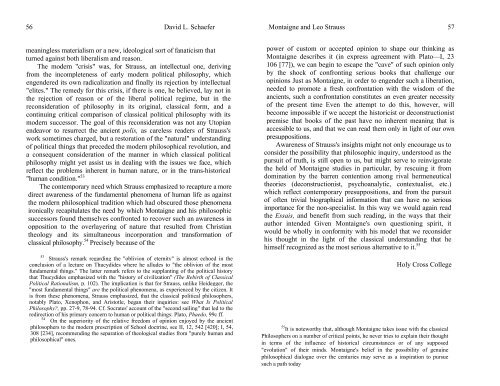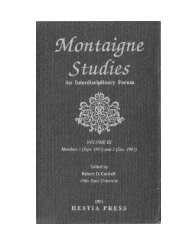Free PDF Download - Montaigne Studies - University of Chicago
Free PDF Download - Montaigne Studies - University of Chicago
Free PDF Download - Montaigne Studies - University of Chicago
Create successful ePaper yourself
Turn your PDF publications into a flip-book with our unique Google optimized e-Paper software.
56 David L. Schaefer<br />
meaningless materialism or a new, ideological sort <strong>of</strong> fanaticism that<br />
turned against both liberalism and reason.<br />
The modern "crisis" was, for Strauss, an intellectual one, deriving<br />
from the incompleteness <strong>of</strong> early modern political philosophy, which<br />
engendered its own radicalization and finally its rejection by intellectual<br />
"elites." The remedy for this crisis, if there is one, he believed, lay not in<br />
the rejection <strong>of</strong> reason or <strong>of</strong> the liberal political regime, but in the<br />
reconsideration <strong>of</strong> philosophy in its original, classical form, and a<br />
continuing critical comparison <strong>of</strong> classical political philosophy with its<br />
modern successor. The goal <strong>of</strong> this reconsideration was not any Utopian<br />
endeavor to resurrect the ancient polis, as careless readers <strong>of</strong> Strauss's<br />
work sometimes charged, but a restoration <strong>of</strong> the "natural" understanding<br />
<strong>of</strong> political things that preceded the modern philosophical revolution, and<br />
a consequent consideration <strong>of</strong> the manner in which classical political<br />
philosophy might yet assist us in dealing with the issues we face, which<br />
reflect the problems inherent in human nature, or in the trans-historical<br />
"human condition." 53<br />
The contemporary need which Strauss emphasized to recapture a more<br />
direct awareness <strong>of</strong> the fundamental phenomena <strong>of</strong> human life as against<br />
the modern philosophical tradition which had obscured those phenomena<br />
ironically recapitulates the need by which <strong>Montaigne</strong> and his philosophic<br />
successors found themselves confronted to recover such an awareness in<br />
opposition to the overlayering <strong>of</strong> nature that resulted from Christian<br />
theology and its simultaneous incorporation and transformation <strong>of</strong><br />
classical philosophy. 54 Precisely because <strong>of</strong> the<br />
53 Strauss's remark regarding the "oblivion <strong>of</strong> eternity" is almost echoed in the<br />
conclusion <strong>of</strong> a lecture on Thucydides where he alludes to "the oblivion <strong>of</strong> the most<br />
fundamental things." The latter remark refers to the supplanting <strong>of</strong> the political history<br />
that Thucydides emphasized with the "history <strong>of</strong> civilization" (The Rebirth <strong>of</strong> Classical<br />
Political Rationalism, p. 102). The implication is that for Strauss, unlike Heidegger, the<br />
"most fundamental things" are the political phenomena, as experienced by the citizen. It<br />
is from these phenomena, Strauss emphasized, that the classical political philosophers,<br />
notably Plato, Xenophon, and Aristotle, began their inquiries: see What Is Political<br />
Philosophy?, pp. 27-9, 78-94. Cf. Socrates' account <strong>of</strong> the "second sailing" that led to the<br />
redirection <strong>of</strong> his primary concern to human or political things: Plato, Phaedo, 99c ff.<br />
54 On the superiority <strong>of</strong> the relative freedom <strong>of</strong> opinion enjoyed by the ancient<br />
philosophers to the modern prescription <strong>of</strong> School doctrine, see II, 12, 542 [420]; I, 54,<br />
308 [234], recommending the separation <strong>of</strong> theological studies from "purely human and<br />
philosophical" ones.<br />
<strong>Montaigne</strong> and Leo Strauss 57<br />
power <strong>of</strong> custom or accepted opinion to shape our thinking as<br />
<strong>Montaigne</strong> describes it (in express agreement with Plato—I, 23<br />
106 [77]), we can begin to escape the "cave" <strong>of</strong> such opinion only<br />
by the shock <strong>of</strong> confronting serious books that challenge our<br />
opinions Just as <strong>Montaigne</strong>, in order to engender such a liberation,<br />
needed to promote a fresh confrontation with the wisdom <strong>of</strong> the<br />
ancients, such a confrontation constitutes an even greater necessity<br />
<strong>of</strong> the present time Even the attempt to do this, however, will<br />
become impossible if we accept the historicist or deconstructionist<br />
premise that books <strong>of</strong> the past have no inherent meaning that is<br />
accessible to us, and that we can read them only in light <strong>of</strong> our own<br />
presuppositions.<br />
Awareness <strong>of</strong> Strauss's insights might not only encourage us to<br />
consider the possibility that philosophic inquiry, understood as the<br />
pursuit <strong>of</strong> truth, is still open to us, but might serve to reinvigorate<br />
the held <strong>of</strong> <strong>Montaigne</strong> studies in particular, by rescuing it from<br />
domination by the barren contention among rival hermeneutical<br />
theories (deconstructionist, psychoanalytic, contextualist, etc.)<br />
which reflect contemporary presuppositions, and from the pursuit<br />
<strong>of</strong> <strong>of</strong>ten trivial biographical information that can have no serious<br />
importance for the non-specialist. In this way we would again read<br />
the Essais, and benefit from such reading, in the ways that their<br />
author intended Given <strong>Montaigne</strong>'s own questioning spirit, it<br />
would be wholly in conformity with his model that we reconsider<br />
his thought in the light <strong>of</strong> the classical understanding that he<br />
himself recognized as the most serious alternative to it. 55<br />
Holy Cross College<br />
55 It is noteworthy that, although <strong>Montaigne</strong> takes issue with the classical<br />
Philosophers on a number <strong>of</strong> critical points, he never tries to explain their thought<br />
in terms <strong>of</strong> the influence <strong>of</strong> historical circumstances or <strong>of</strong> any supposed<br />
"evolution" <strong>of</strong> their minds. <strong>Montaigne</strong>'s belief in the possibility <strong>of</strong> genuine<br />
philosophical dialogue over the centuries may serve as a inspiration to pursue<br />
such a path today




